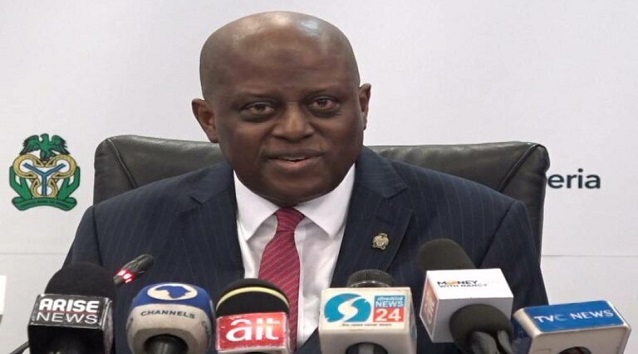E-Financial
SEC DG says Capital Market Developing Products to Attract Younger Generation

Mr. Lamido Yuguda, the Director General, Securities and Exchange Commission (SEC), has stated that the capital market regulating body is working to develop products targeted at making the market attractive to the younger generation in a bid to further deepen the market.

Yuguda who was represented by the Head, Office of the Chief Economist of the SEC, Dr. Okey Umeano, recently in an interview stated that this is one of the provisions made in the revised capital market plan in a bid to make further products available to the populace.
According to him, “I must tell you that the demographic in our market is graying and it is a source of worry. That is one of the things we are covering in the Revised Capital market master plan. We are encouraging Capital Market operators to develop technology. The youths do not want to come in and start filling five page forms because they want to access the market, they want to pick their phones and make their investments.
“That is why we are improving our Know Your Customers;we are improving so many things to make it easier for them. That is why we are introducing these Fintechs. We are allowing these Fintechs to come because we see the Fintech as an important gateway for youths to enter the market. We are conscious of that and we are working towards it.”
Yuguda said that the youths must understand that the capital market is a viable platform for wealth creation assuring them that the SEC and the market is working on how best to serve them.
“We are striving to improve the way we deliver our products, to improve market efficiency and to make the market attractive to them. Most importantly, we are doing all we can to ensure that investors are adequately protected in the market and that they are able to get the benefits of their investments” he stated.
He further stated that the SEC is working to ensure that the commodities market gets all the support required to grow and support the economy.
“We have about 6 commodities exchanges and we are doing a lot to bring them up to standard. We cannot say that we want to grow the agricultural part of our economy if we do not have a market to support it and that is what we are doing. That market is growing in leaps and bounds, so that is another achievement.
“We are beginning to see some results of these our efforts in that area. Before now, when we did not have this market, farmers were not able to get good price discovery for their products. Therefore, if you have a good commodities exchange, it helps price discovery and it helps credit to flow to the farmers.
Umeano stated that because there is good price discovery, people can now ascertain what they can get if they farm a particular produce within a particular period. That is what the value chain that commodities segment of the market is opening up.
“You will soon start seeing it. It is happening but you know it is a new area, it is growing and it is an area we are proud of. it is growing in leaps and bounds; you can see the percentage growth that we have.
But I must tell you, it is still a small market compared to the size of the Nigerian economy but then they said the journey of a thousand miles starts with a step and I can tell we have made many steps in that direction.
He disclosed that the SEC has increased the number of products in the market as the market now has derivatives and also started to support the non-interest capital market.
“We are now getting issuances in the non-interest area and we are expanding the opportunities for everyone. We are also involved in integrating the capital markets across Africa and across West African region too, we are a pace setter there.
“We are also trying to expand what is available to people who are investors in Nigeria so these are things we have done. I am not saying that the SEC has done all that is possible to do but I know that we are on track” he added.
E-Financial
Kuda Bank Teams Up with Lovers & Frnds for Inclusive Valentine’s R&B Bash

Kuda Microfinance Bank partnered with Lovers & Frnds for a Valentine’s edition event on Sunday, February 15, at Space Hub Lekki, Lagos, redefining celebrations around love, friendship, and social connections beyond romance.

Kuda Bank
The R&B-themed gathering drew couples, friend groups, and solo attendees with music sets from DJs like TGarbs, games, gift exchanges, and colour-coded tags—red for relationships, yellow for mingling singles, orange for non-minglers—to spark easy interactions.
Kuda activated a branded photo booth, merchandise giveaways, prize activities, and complimentary drinks for Premium loyalty tier customers, while vendors used Kuda Business POS terminals for seamless cashless payments.
Senior Brand Manager Emmanuel Femi-Adejobi said: “We partner with experiences matching our customers’ lifestyles in music and entertainment, creating spaces they genuinely connect with—we’ll keep supporting how they live and celebrate.”
E-Financial
CBN Slashes Rate by 50bps

By Mathew Anthony, Market Analyst at FXTM
In another positive development for Nigeria, the CBN has proceeded with 50-basis points rate cut.

FXTM Logo
With favourable fundamental forces at play, it was always a question of how much rather than if rates will be cut in February.
Although some were expecting a hefty 100-basis point cut, this was still a positive move by the CBN, mirroring the dovish strategy of other major banks on the continent.
Interest rates were slashed thanks to cooling inflationary pressures, a stronger Naira and rising FX reserves.
This move is likely to boost confidence over the economic outlook ahead of the Q4 GDP report scheduled for release later this month.
E-Financial
CBN Cuts MPR by 50bps to 26.50% as Inflation Eases for 11th Month

Central Bank of Nigeria (CBN) has lowered its Monetary Policy Rate (MPR) by 50 basis points to 26.50 percent from 27 percent, a unanimous decision announced by Governor Olayemi Cardoso at the end of the 304th Monetary Policy Committee (MPC) meeting in Abuja on Tuesday.

CBN
Cardoso cited 11 straight months of decelerating headline inflation—reaching 15.10 percent in January 2026 per National Bureau of Statistics—as key, driven by prior tightening lags, naira stability, food supply gains, steady petroleum prices, export earnings, remittances, and balance of payments strength.
Liquidity ratio stays at 30 percent, CRR unchanged at 45 percent for commercial banks (16 percent merchant banks) and 75 percent non-TSA public deposits; standing facilities corridor now +50/-450 basis points around MPR.
The MPC retained other parameters, welcoming Executive Order 09 redirecting oil/gas revenues to the federation account for fiscal boost, last cutting rates in September 2025 after November’s hold.

 Telecom3 days ago
Telecom3 days agoCyber Immunity Emerges as Shield for Nigerians Amid Rising Scams

 E-Financial3 days ago
E-Financial3 days ago$214Bn Missing, Institutions Silent: Is Accountability Dead in Nigeria?

 E-Business3 days ago
E-Business3 days agoInterswitch Partners Abia to Digitise Public Hospitals

 General News3 days ago
General News3 days agoNITDA, Abia Partner on Enterprise Architecture Reform

 News2 days ago
News2 days agoNITDA Urges Stronger State Partnerships as Key to Digital Economy Goals @ South-South Stakeholders Forum

 E-Business3 days ago
E-Business3 days agoWIEG 2026 Summit Shifts to April 22-23 for Maximum Impact

 Telecom2 days ago
Telecom2 days agoGSMA Launches Innovation Fund to Accelerate Green Transition Through Mobile Technology

 E-Business2 days ago
E-Business2 days agoFirm Identifies RenEngine Loader Distributed Through Pirated Games and Software


























